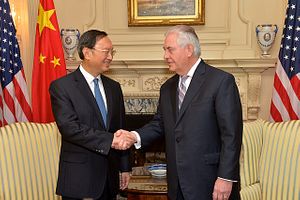On August 22, the new U.S. administration imposed a new round of sanctions — two months after the first round — against “Chinese and Russian entities and individuals supporting the North Korean regime.” Although China is still unhappy about the U.S. “unilateral sanctions,” China remained relatively reserved this time.
The U.S. Department of the Treasury accused ten entities (six Chinese-owned entities, one Russian, one North Korean and two based in Singapore) and six individuals (four Russians, one Chinese and one North Korean) for four violations including assisting individuals already designated for supporting North Korea’s nuclear and ballistic missile programs, involvement in the North Korea energy trade, facilitating the exploitation of workers and enabling sanctioned North Korean entities to access U.S. and international financial systems.
China’s first reaction seemed to be irritation. On August 22, a Chinese embassy spokesman replied: “We strongly urge the U.S. to immediately correct its mistake, so as not to impact bilateral cooperation on relevant issues.” The embassy spokesman’s immediate reply was actually a word-by-word repetition of what China’s foreign ministry had said the first time when the U.S. sanctioned Chinese enterprises over North Korea.
Interestingly, regarding the sanctions, China’s foreign ministry responded in a lower key on the next day: although China still opposed the “unilateral sanctions outside the framework of the UN Security Council” or the “long-arm jurisdiction,” China didn’t “strongly urge” the U.S. this time.
At the regular Press Conference on August 23, spokesperson Hua Chunying said:
The relevant actions of the United States cannot help to resolve the relevant issues. Neither are they conducive to the mutual trust and cooperation between China and the United States on the relevant issues. We request the United States to immediately stop the relevant wrongdoing.
In addition, Hua also expressed China’s willingness to punish related entities if they found “guilty” under China’s law:
China always implements the DPRK-related resolutions of the UN Security Council in their entirety and fulfills its due international obligations. Our efforts are there for all to see. We will investigate and deal with the Chinese enterprises and individuals in accordance with our own domestic laws and regulations provided that they are suspected of violating the relevant resolutions of the UN Security Council.
On the same day, Chinese State Councilor Yang Jiechi held a telephone conversation with U.S. State of Secretary Rex Tillerson. It’s worth noting that — at least in the Chinese version — both officials didn’t talk about anything related to the North Korean issue, let alone the U.S. sanctions, but did speak on China-U.S. relations and the Afghanistan issue. Yang also sent a good-will signal to Tillerson that he hoped “the two countries will expand cooperation and properly settle differences so as to keep up a good momentum for the development of China-U.S. relations.”

































